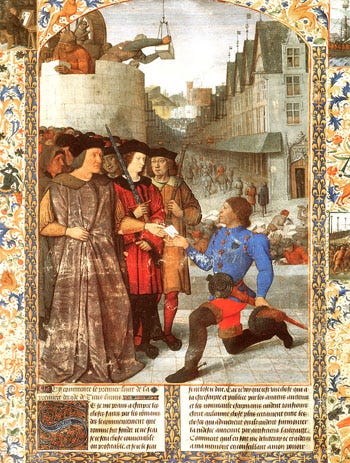The ultimate poz-event motivating the creation of this blog now as opposed to later was a single tweet that knocked forward a line of dominoes I'd been setting up for a long time.
The tweet itself is not the poz; it is what sits in the replies. I won't go any further without saying that even considering a law such as this is a declaration of war against Christians and ought to be recognized as such. The UK authorities have no stomach or intent to enforce this on their Muslim colonists. The replies were, however, a perfect showcase of a remarkably and disturbingly common mental frame on the 'Right,’ with about half reading as some formation of;
“They can't enforce this! How will you prove I was praying! There's no proof! How will they arrest you?”
Let me explain very quickly how they'll arrest you, and then we'll tackle the rest of this. They'll walk up to you, slap you in irons, and take you away.
The very bases of these replies rest on a whole set of assumptions, all of which are false. Ultimately, they all reflect what I will call the Merchant Spirit. The Merchant Spirit is a historically-placed understanding of what I can only explain as the “virtue” of cleverness. As the Aristocrat has prudence, the Warrior has honor, the Artisan has skill, and the farmer has the dignity of labor or diligence; the merchant has cleverness.
Manifesting itself as a worship of technicality, this merchant spirit pervades our culture and almost all aspects of political discourse. The perfect summation of this idea from Mike Cernovich in the form of his 'Clever Boys' memetic:

And he could not be more right.
Reading those comments, my whole body cries out - wishing they'd said it in front of me instead of the simulation of the public square that Twitter approximates. I want to grab them and shake them. You were just declared an enemy of the state. Your religion was just made illegal. You are now a spiritual fugitive, whether you agree to that or not. What is your response? Smug indignation about how actually, if I'm praying silently, they won't have the evidence to prove that I was praying!
Well technically, that law is unconstitutional. Well technically, Obamacare is a tax. Well technically, CRT is racist to whites. Well technically you've lost every battle for the last 70 years and now they've made your thoughts illegal.
By now you've thought of a thousand other ways you've seen or heard this cope used, from casual conversation to the plotlines of major Hollywood movies and shows. It would be easy to dismiss this ‘loophole obsession’ as a pure result of laziness but it bites at me as something deeper. When did we all become clever boys and why did we miss the forest for the trees?
I believe that the worship of cleverness is a social consequence of the utter victory of ‘liberal’ legalism over the custom of common life. Only a people who have thoroughly internalized rule by contract instead of spirit or justice would negotiate in technicality - let alone hold up cleverness as a virtue.
Healthy societies have no need for cleverness, which is distinct from intellect or wisdom in its deceit and its subordination of reality to language instead of the reverse. In Machiavellian terms, we see the classic struggle between the Lion and the Fox. The Lion is the classic patriarch. He values benevolence, prudent rule, and honor. He is direct, honest, and confrontational. The Lion is concerned with what is and its resolution. Meanwhile, the Fox is the image of the schemer. Wily and cunning, the Fox is the master of maneuver; he could not prevail in a headlong assault.
These characters once reflected a deep struggle for power at the heart of our society, but perhaps no longer. Are there any Lions left? If there are, they are far too few and scattered to matter. Our society is ruled by Foxes now, and the way we talk has been aped by their victory. The Fox's grip on power has become so thorough that our political debates now center on appeals to technical details, to single words and bureaucratic processes- entirely divorced from the world that people inhabit. The country may be thrown into chaos when the Supreme Court decides that, technically, there exists an unwritten right to such-and-such thing. Undone with equal fervor when, with a new composition, the Court declares that technically no such thing ever existed.
Our fights over these technicalities and the letter-realm they inhabit cause a two-fold problem: the first is that the letter-realm is not real, the real is real. A contract can be enforced to the 't' and still be evil; this is often the case. Humans are fallible and this may be the final point which enjoys 'full spectrum dominance' ie, we all agree. And yet, context is beholden to contract. The second problem is that even if rule by letters was an acceptable frame to carry, it is not one that contains the possibility of our triumph. It won't work.
The Fox elites' appeal to technicality succeeded on the grounds that it appealed to Christian society's vision of justice and the old Lion cadre's commitment to fairness. To the Lion, a fight worth winning is head-on and victory never brings triumph without stakes. Fairness brings the real winners to the top. But the Lions are gone, and Christian justice technically violates the Separation of Church and State. In their place is power.

Power is what will be used against us, of course, if we continue to appeal to technicality and not to the reality with which we truly align.
The Medievals, our pre-liberal predecessors, did not see society as a Foucaultian field of isolated individuals bound together through consent and contract law to limited intermingling; their frame could not have been more alien to us. They believed in a Great Chain of Being, one that encompassed and ensnared all of us, from the highest King to the lowliest farmer. We exist together, as social beings, created by God to live together and to depend on one another, not as accident but by design. Bound up in this chain is duty to all those who depend on you, reciprocated to all those who depend on them. The miller grinds flour because his neighbors must eat, not because his ambition soars to own every mill in Christendom.
The Aristocrat, the Warrior, the Artisan, and the Peasant, each with their own unbroken belonging in the Great Chain of Being. That class viewed with suspicion, however, was the Merchant.
The merchant, as a class, was discriminated against for not contributing to these essential duties, but rather for aiming to get rich himself. His pursuit of gain was considered against the laws of God, because he was not a producer of real goods, but rather a resaler, or a usurer.2
A successful Aristocrat guided his shire to prosper, a great warrior protected the realm, the good artisan crafted the fine instrument- his work an exhibition of refined skill. Even the decent peasant found the dignity of cultivated work, and literally reaped what he sowed. The Merchant, however, succeeds in cunning. The great Merchant sells high and buys low, profiting only himself.
The Spirit of the Merchant may be the spirit of our age, but it need not be the spirit of the next. Good Christians need to confront the political as it really is, contesting power to be exercised towards real goods and for the benefit of real people.
The Fox and The Lion, William Stout, American Legacy Fine Arts https://www.americanlegacyfinearts.com/artwork/the-fox-and-the-lion
Societal Structure and the New Urban Economy, Medieval Merchant Culture, Brown University 2010. https://www.brown.edu/Departments/Italian_Studies/dweb/society/structure/merchant_cult.php








Great essay.
This was my favorite part, really nice paragraph:
"Well technically, that law is unconstitutional. Well technically, Obamacare is a tax. Well technically, CRT is racist to whites. Well technically you've lost every battle for the last 70 years and now they've made your thoughts illegal."
I think you would benefit from reading MythPilot's essay on human vs antihuman systems, this essay covers a lot of the origins of modern thinking in contrast to how traditional civilization functioned.
https://mythpilot.substack.com/p/great-house-plan-ii
The merchant spirit is an incredibly useful concept and one which I think I had only felt or seen expressed as the joke from Futurama about technically correct being the best kind of correct.
BAP's recent writing on monarchy expressed the priest class as being word-oriented but I rather think it is more the merchant style contract-word-thinking age that we are living in and which puts forth a different set of problems.